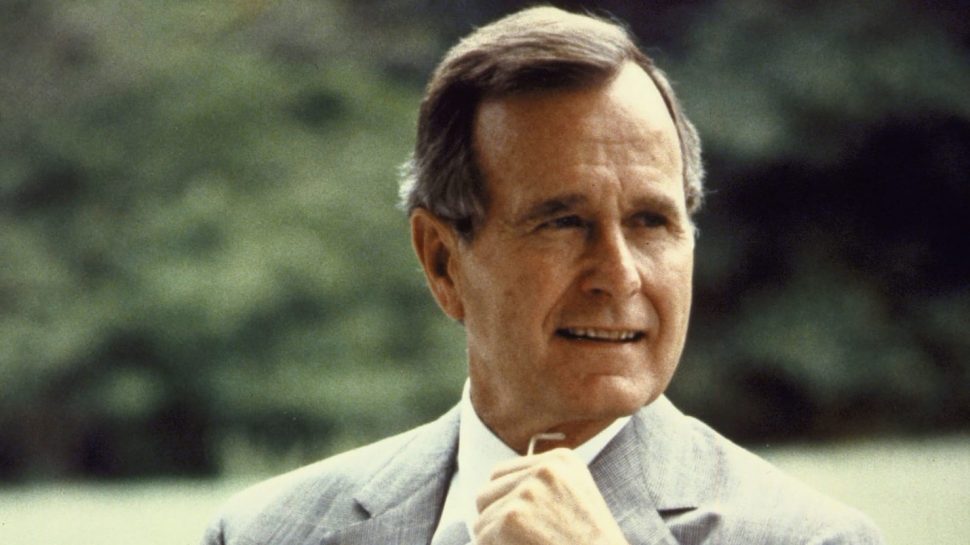
WASHINGTON – He was president for only four years, but George H.W. Bush shaped U.S. history for decades, taking on tough jobs from Beijing to the CIA, ousting Iraqi forces from Kuwait, sealing a breakthrough budget deal that cost him an election and fathering a future president.
He died on Friday at the age of 94, his family said. His passing came seven months after the April 17, 2018, death of his wife, Barbara, to whom he was married for 73 years.
His presidency, which ran from 1989 to 1993, was defined by two events – his aggressive response to Iraqi President Saddam Hussein’s invasion of Kuwait in 1990, and the soon-to-be-broken “read my lips” pledge he made not to raise taxes while running for president in 1988.
At a time when the Cold War was ending and the influence of Soviet-style communism was withering, Bush’s military and diplomatic actions firmly cast the United States as the world’s leading superpower.
After Bush emphatically said Saddam’s aggression “will not stand,” U.S.-led forces routed Iraq’s army in the Gulf War, driving it from Kuwait while stopping short of taking Baghdad, Iraq’s capital. Bush’s popularity rating among Americans soared to about 90 percent.
Twenty months later, in 1992, the Republican Bush lost his bid for re-election to Democrat Bill Clinton, whose folksy manner and focus on the economy struck a chord with many Americans and made Bush seem disconnected from voters for focusing on foreign policy over domestic issues.
Despite a broad coalition that included several Arab states, U.S. involvement in the Gulf War was seen as a violation of Arab sovereignty by some in the Middle East, and led a few militant groups – namely Osama bin Laden’s recently formed al Qaeda – to turn their focus toward fighting U.S. influence. A decade later, the presidency of Bush’s son, George W. Bush, would be jolted by al Qaeda’s deadly hijacking attacks on the United States on Sept. 11, 2001.
The Bushes were only the second father and son to serve as U.S. presidents – the first being John Adams (1797-1801) and John Quincy Adams (1825-1829). The Bush political dynasty also included Bush’s father, who was a U.S. senator, and son Jeb, a former governor of Florida who mounted his own run for the presidency in 2015 but dropped out in February 2016 after gaining little traction.
Bush did not endorse Republican Donald Trump, the eventual winner in the 2016 presidential election, who attacked both Jeb and George W. Bush during his campaign. The elder Bush did not publicly say whom he voted for in the election, but a source told CNN he went for the Democratic nominee, Hillary Clinton.
‘NO NEW TAXES’
George Herbert Walker Bush was a moderate Republican known for his diplomacy and ability to compromise with Democrats. He was a symbol of a relatively collegial period in Washington that nevertheless set the stage for the divisive, partisan gridlock that now plagues the U.S. capital.
When he accepted the Republican nomination for president in 1988, Bush, then Ronald Reagan’s vice president, was trying to win over conservatives who had more enthusiasm for Reagan. He answered questions about his conservatism with an emphatic pledge.
“Read my lips,” he told the Republican National Convention. “No new taxes.”
Later as president, Bush agreed to raise taxes to help reduce the government’s deficit. The reversal angered conservatives and led in 1992 to an unusual primary challenge of the incumbent president by another Republican, conservative commentator Pat Buchanan.
Bush easily defeated Buchanan for the Republican nomination, but his stance on taxes, the country’s debt and the lagging economy led Texas billionaire Ross Perot to launch an independent presidential campaign.
SPONSORED
Clinton ended up winning the race with just 43 percent of the popular vote, ousting Bush from the White House after one term.
Bush’s loss in the 1992 election made him a cautionary tale for a generation of Republicans, a lesson that endures in today’s showdowns over the federal budget and spending.
Years later, in 2014, Bush was honoured with the Profile in Courage Award for his 1990 budget compromise by the John F. Kennedy Library Foundation, which praised the “decision to put country above party and political prospects.”
In issuing the award for his compromise with Democrats, the foundation wrote: “Although he recognized the 1990 budget deal might doom his prospects for reelection, he did what he thought was best for the country and has since been credited with helping to lay the foundation of the economic growth of the 1990s that followed.”
A major accomplishment of Bush’s presidency can be seen every day across America – from the cut-away curbs on street intersections to the ramps outside buildings that allow access to those confined to wheelchairs.
They were mandated by the 1990 Americans with Disabilities Act, the law Bush signed that barred discrimination against the disabled in the workplace and ensured them equal access to public accommodations.
Bush backed the law despite concerns from some conservatives in his party about the cost and potential litigation.

